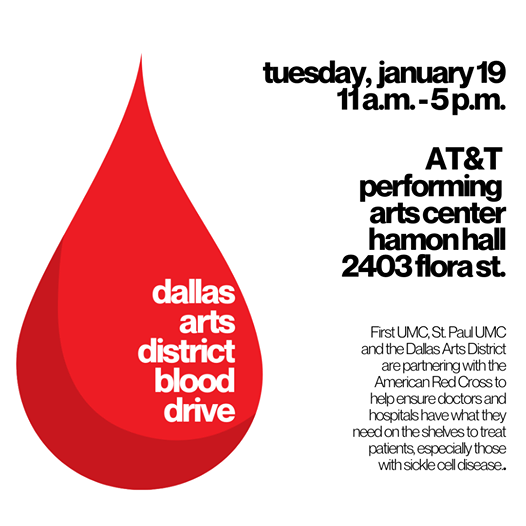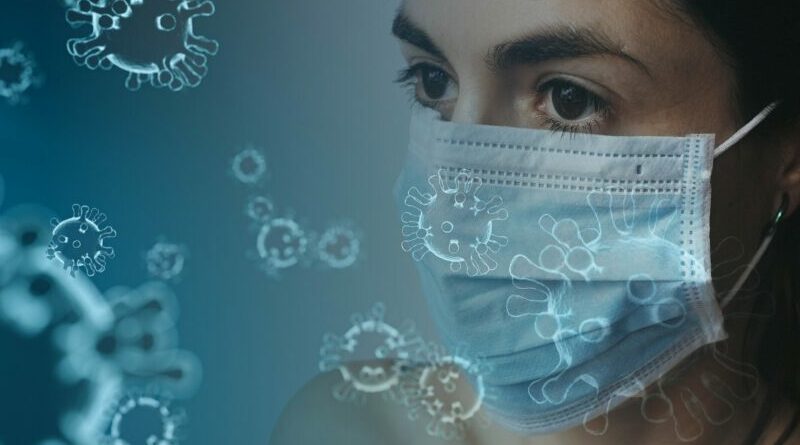How Long Are COVID-19 Patients Immune?
As the COVID-19 pandemic continues to strain hospital systems and vaccine rollout continues, here’s what you need to know today:
- Becoming infected with COVID-19 grants immunity, but a not for long;
- Dallas County reports 1,993 more COVID cases, 17 deaths;
- Texas first state to administer 1 million COVID-19 vaccines;
- SMU developing quicker antibody test;
- Blood drive to be held in the Arts District.
How Long Are COVID-19 Patients Immune?
It’s been a long-discussed question since the pandemic began – if you catch COVID-19, how long are you immune?
A new study from Public Health England reveals that most are susceptible to potential re-infection beginning around five months after catching it.
But the study – which has not been peer reviewed yet – did have some caveats. For instance, even though past infection seemed to indicate that there could be about an 83% lower risk of reinfection, researchers said wasn’t necessarily the case for everyone, and they’re still not quite sure how long the immunity lasts, or whether those who have a degree of immunity could still carry the virus in their nose or throat and transmit it to others.
“We now know that most of those who have had the virus, and developed antibodies, are protected from reinfection, but this is not total and we do not yet know how long protection lasts,” Susan Hopkins, senior medical adviser at PHE and co-leader of the study, said in a statement to CNN.
Dallas County Reports 1,993 More COVID Cases, 17 Deaths
Dallas County Thursday reported 1,993 more COVID-19 cases – 1,796 confirmed and 197 probable – and 17 additional deaths.
Since the beginning of the pandemic, the county’s reported a cumulative total of 201,744 confirmed cases, 25,878 probable cases, and 1,829 deaths.
The additional deaths reported Thursday include a Dallas woman in her 30s, a Garland woman in her 50s, two Mesquite men in their 50s, a Dallas man in his 50s, a Mesquite woman in her 60s, a Mesquite man in his 60s, two Dallas men in their 60s, a Garland man in his 70s, an Addison woman in her 70s, a Highland Park man in his 90s who died in hospice, and a Desoto woman in her 90s. Unless otherwise noted, they had underlying conditions.
Also among the deaths reported Thursday were a woman in her 50s who lived at a Mesquite long-term care facility, a woman in her 80s who lived at a Garland long-term care facility, a man in his 90s who lived at a Dallas long-term care facility, a man in his 90s who lived at a Mesquite long-term care facility.
The provisional seven-day average of daily new confirmed and probable cases (by date of test collection) for the week ending Jan. 2 was to 2,227, which is a rate of 84.5 daily new cases per 100,000 residents — the highest case rate in Dallas County since the beginning of the pandemic.
The percentage of respiratory specimens testing positive for the virus that causes COVID-19 remains high, with 31% of symptomatic patients presenting to area hospitals testing positive in the week ending Jan. 2. Since the beginning of the pandemic, over 3,864 healthcare workers and first responders have been diagnosed with COVID-19 in Dallas County.
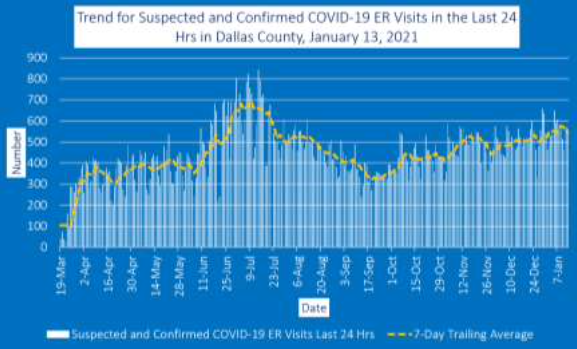
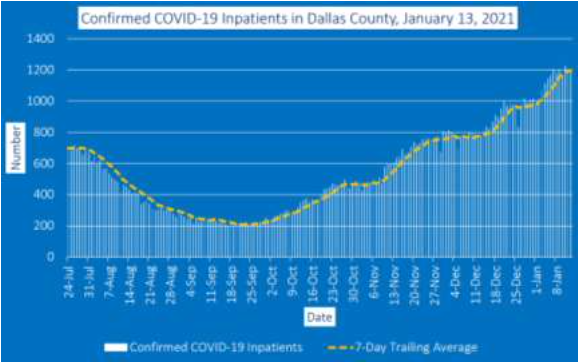
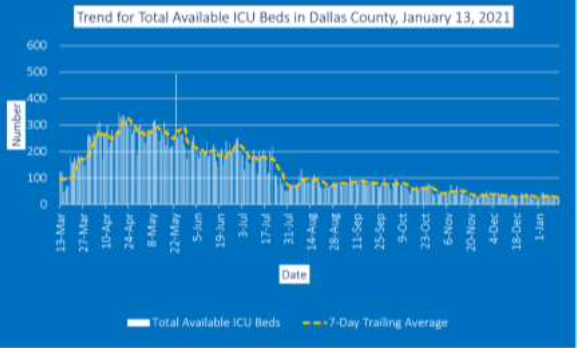
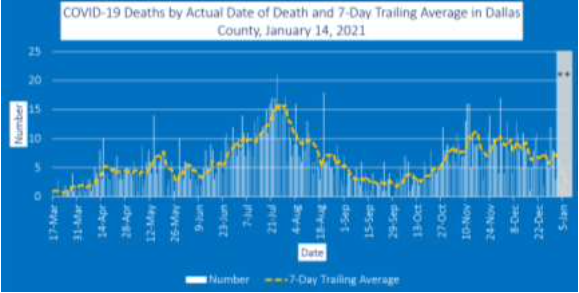
Dallas County reported there were 1,204 COVID-19 patients in hospitals Wednesday, and the number of emergency room visits for COVID-19 like symptoms in Dallas County was 564 for the same time-period, which represents around 22% of all emergency department visits in the county according to information reported to the North Central Texas Trauma Regional Advisory Council.
“We continue to remain very concerned about the impact COVID is having on our hospital systems and healthcare heroes. With only 20 adult ICU beds available today in Dallas County, and the prediction of a tough January and February ahead, it’s critical that you follow the advice of the local doctors,” said Dallas County Judge Clay Jenkins. “Wear your mask around anyone outside of your immediate household. Wash your hands frequently. Avoid crowds and get-togethers. Do your grocery shopping and support restaurants through curbside pickup or delivery. When the weather is nice, try and take advantage of that and exercise outdoors. We are all in this together and we will get through this North Texas.”
UT Southwestern Medical Center’s data shows COVID-19 hospitalizations increased by 24% over the past two weeks.
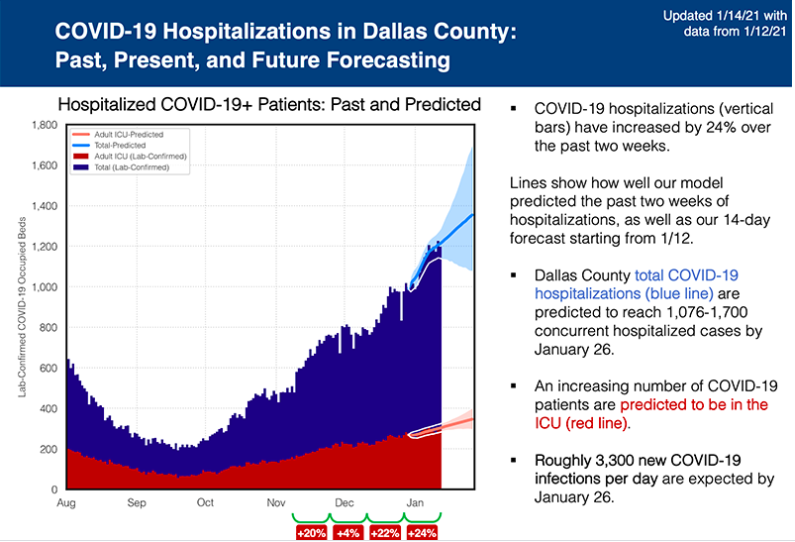
UTSW’s model projects total COVID-19 hospitalizations in Dallas County could reach between 1,076 and 1,700 concurrent hospitalized cases by Jan. 26, and roughly 3,300 new COVID-19 infections per day by Jan. 26.
The county also reported there are 109 active long-term care facility outbreaks.
A total of 3,286 residents and 1,871 healthcare workers in long-term facilities in Dallas have been diagnosed with COVID-19. Of these, 709 have been hospitalized and 378 have died. About 22% of all deaths reported to date have been associated with long-term care facilities.
The county also reported 34 outbreaks of COVID-19 in congregate-living facilities like homeless shelters, group homes, and halfway homes in the past 30 days associated with 84 cases.
Also, over the past 30 days, there have been 7,310 COVID-19 cases in school-aged children and staff reported from 674 separate K-12 schools in Dallas County, with 1,842 of these cases reported during the last week of December.
Since the beginning of the pandemic, a total of 41 cases of COVID-19 have been reported among school nurses and nurse assistants — almost half (19) of which have been diagnosed within the past week.
One COVID-19 outbreak in a school in December originated with spread among 11 staff members, with transmission to nine students, and subsequent infections documented among at least eight household members of these students. One death and one hospitalization occurred from this outbreak.
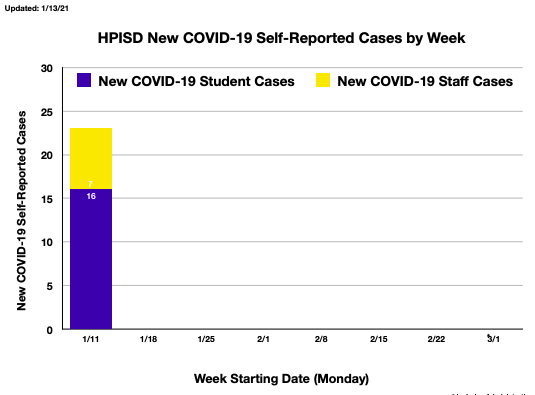
As of Thursday, Highland Park ISD reported four cases among staff members assigned to Armstrong Elementary, five among students there, two cases among staff members assigned to Boone Elementary, three among students there, two among students at Bradfield, four among students at University Park, two among staff members assigned to McCulloch Intermediate, two among students there, four among students at Highland Park Middle School, three among staff members at Highland Park High School, and 19 among students there, according to the district’s COVID-19 webpage.
As of Thursday, Dallas ISD’s reported 3,203 total cases districtwide, 1,581 among campus staff, 352 among central staff, and 1,270 among students, according to the district’s COVID-19 dashboard.
Texas First State To Administer 1 Million COVID-19 Vaccines
Gov. Greg Abbott and the Texas Department of State Health Services (DSHS) Thursday announced that Texas has administered more than 1 million doses of the COVID-19 vaccine — making Texas the first to reach that milestone. This milestone comes exactly one month to the day after the first doses arrived at vaccine providers in the state on Dec. 14.
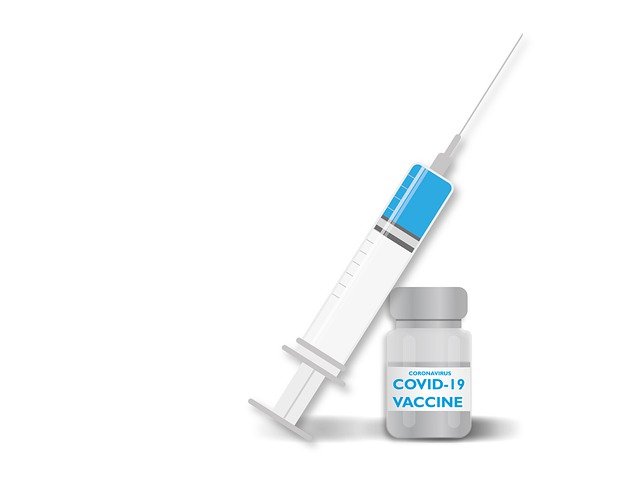
Among the top 20 states for doses distributed, Texas ranks number one for percentage of doses administered.
“Texas is leading the way for our nation once again,” said Abbott. “This is the biggest vaccination effort we have ever undertaken, and it would not be possible without the dedication and tireless efforts of our healthcare workers. We still have a long road ahead of us, but Texans continue to prove that we are up to this challenge.”
Voluntary vaccination continues throughout the state for front-line health care workers, residents at nursing homes and assisted living facilities, and Texans over 65 or with a chronic medical condition to aid in reducing hospitalizations and protect the health of those in these vulnerable populations. Texas receives more vaccine from the federal government each week and expects the weekly amount to increase in the future.
SMU Developing Quicker Antibody Test
SMU researchers Ali Beskok and J.-C. Chiao are leading a team responsible for developing a new rapid antibody test for COVID-19 that produces results in two to three minutes and is far more accurate than tests in use right now.
The team’s test – called a “Lab on a Chip” – needs a single drop of blood to look for genetic markers that indicate the person’s body has responded to COVID-19 at some time.
Beskok and Anil Koklu, who got his doctorate in mechanical engineering at SMU, initially began working on the device in 2018 as a way to detect malaria and tuberculosis.
“Our device contains highly-sensitive electrodes that can specifically capture those targeted antibodies,” Chiao said in a statement. “Once captured, a signal will be generated to the attached electronics and send information to the user’s smartphone.”
The test is also relatively low in cost – the team said that the electronic instrument to read the test would be about $15-20, and the cost of the disposable cartridge to collect the blood would be around $1.
Blood Drive to be Held in the Arts District
First United Methodist Church-Dallas and Saint Paul United Methodist Church are partnering with the American Red Cross for a blood drive Tuesday, Jan. 19, from 11 a.m. to 5 p.m. at the AT&T Performing Arts Center.
